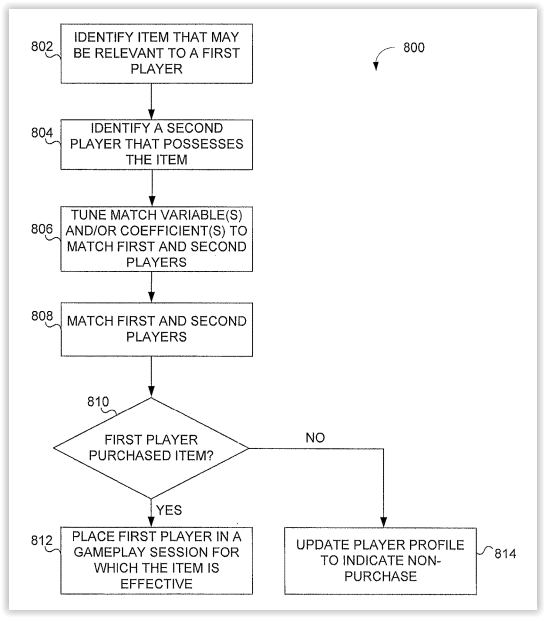Activision has received a patent for a system that encourages in-game purchases
The U.S. Patent and Trademark Office granted Activision a patent for using the method of “stimulating [making] microtransactions in multiplayer games.”
How did the story begin?
The Glixel edition was the first to pay attention to the document. Journalists were hooked that the described system, according to the text of the patent itself, can select participants of matches in such a way that it affects the making of payments in the game.
“For example, the system can bring together a more experienced/cool player in a match with a green novice in order to push the novice to make a game purchase of the game item owned by a cooler opponent,” the brief description of the patent says.
Activision promptly responded to Glixel and the IGN website, which quickly picked up the news that the document was nothing more than “a research patent filed with the agency in 2015 by a research team working independently of our game studios. The system was not integrated into the company’s games.”
Bungie, whose publisher today is Activision, separately noted that the described technology is not used in its latest blockbuster, released on consoles this summer Destiny 2.
Despite this, the document is worth close attention. It clearly demonstrates how frituplay and paid projects that have in-game stores work or can work today.
What exactly is the patent about?
The patent consists of 28 pages on which the principles of the system operation are described with pictures. The description is provided with a large number of examples and an explanation of the attached diagrams.
The document is not only about stimulating purchases. Special attention is paid to matchmaking and work on optimizing game sessions. This can be called the foundation of a system whose ultimate goal is to stimulate purchases.
“If a player shows himself badly (that is, if he is killed with a higher frequency than before), the score engine can change one (or more) variables in real time, adjust it to the player so that he starts showing himself in the game from the best side. For example, a player can pick up weaker opponents and stronger teammates,” – this is how, for example, the capabilities of the system are described.
Speaking about the analytics and feedback engine, Activision specifies in the patent that it “can analyze data about a player and determine the role in which the user is most effective. For example, the analytics and feedback engine can find out that a player shows the best results as a sniper (or just likes to play as a sniper the most). This may affect matchmaking, the game will select exactly the match in which the player will be able to act exactly as a sniper.”
There are a lot of descriptions of such tools in the patent. Starting from the capabilities obtained thanks to them, Activision also tells in detail about the work of the microtransaction engine.
For example, he can analyze the presence of various items from cool players and, if there is a sale of these items, the engine will match the cool player with the player who does not have such an item.
Moreover, the system can reward the user for the purchase. The patent mentions a case in which, after buying a certain weapon, a player is thrown into a match where this weapon is most effective.
You can clearly see the work of the system within the framework of the last case on the graph below.

The document can be read at this link.
What do we think about it ourselves?
The system, of course, can be treated critically, if desired, it can be accused of manipulation, that it cannot be called honest and fair to the players.
On the other hand, the opportunities that it (or its analogues) opens (or have long been opened) to developers are unprecedented. The system is able to regulate the entire gaming experience in such a way that the player is constantly interested in the game, regardless of his skill. Against this background, the fact that he is being stimulated to invest a few more dollars in the game once again – why not? Isn’t pleasure worth paying for?
Plus, it seems to me, it doesn’t make sense to be indignant anymore. Late. The experience of playing at least in Clash Royale suggests that such systems have already been put into operation, and their effectiveness, given the cash performance of the game, is beyond doubt.